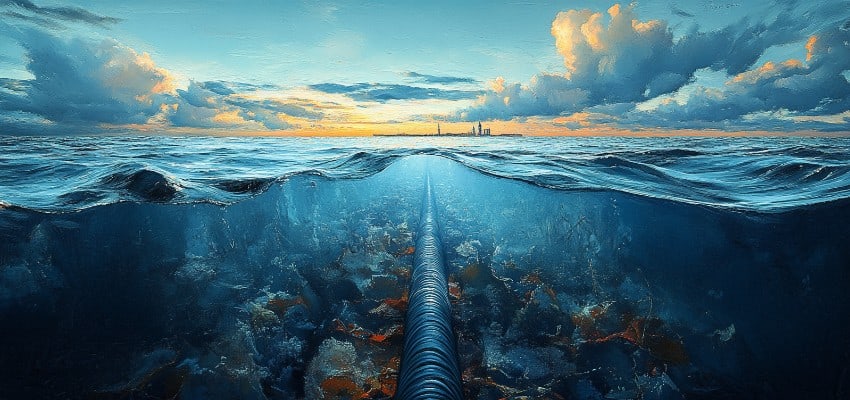Editor’s Note: In today’s interconnected world, the backbone of global communications lies beneath the oceans. The security of undersea fiber optic cables, which transmit the vast majority of international data, has become a critical concern amid rising geopolitical tensions. Recent warnings from Russia have highlighted the vulnerability of these cables, with potential disruptions posing significant risks to global communication and economic stability. This article explores the strategic implications of these threats, the measures being taken by NATO and other entities to safeguard these vital infrastructures, and the broader consequences for international security and the digital economy. Understanding and protecting these undersea networks is essential for ensuring the continuity of global services and stability.
Content Assessment: Global Data Under Threat: The Strategic Importance of Protecting Undersea Cables
Information - 93%
Insight - 94%
Relevance - 92%
Objectivity - 90%
Authority - 90%
92%
Excellent
A short percentage-based assessment of the qualitative benefit expressed as a percentage of positive reception of the recent article from ComplexDiscovery OÜ titled, "Global Data Under Threat: The Strategic Importance of Protecting Undersea Cables."
Industry News – Geopolitical Beat
Global Data Under Threat: The Strategic Importance of Protecting Undersea Cables
ComplexDiscovery Staff
In the intricate landscape of global communications, the integrity and security of undersea fiber optic cables have emerged as critical concerns for nations worldwide. These cables, stretching over 745,000 miles, are responsible for transmitting 95% of international data, making them indispensable to the modern digital economy. However, recent geopolitical tensions have spotlighted their vulnerability, particularly with Russia’s potential threats to disrupt these vital communication channels.
In June, Dmitry Medvedev, deputy chairman of Russia’s Security Council, issued a warning following the incident involving the Nord Stream 2 gas pipeline. Medvedev suggested that in light of what he alleged as Western complicity in the pipeline’s sabotage, Russia might target undersea cables. “If we proceed from the proven complicity of Western countries in blowing up the Nord Streams, then we have no constraints—even moral—left to prevent us from destroying the ocean floor cable communications of our enemies,” Medvedev announced on Telegram.
This proclamation was not received lightly. NATO, along with various Western governments, is taking these threats seriously. In response, NATO has intensified its surveillance and patrols in vulnerable areas, such as the coast of Ireland, to monitor suspicious Russian naval activities. These actions are in addition to setting up automatic warning systems to detect interference and reroute communications via satellite when necessary.
The ramifications of such disruptions are profound. Carl-Oskar Bohlin, Sweden’s minister for civil defense, noted that damage to a telecommunications cable under the Baltic Sea in 2023 was the result of “external force or tampering,” underscoring the tangible risks posed by these vulnerabilities. Similarly, international security expert Melanie Garson from University College London emphasized Russia’s longstanding development of such disruptive capabilities as part of its “gray zone” tactics, which skirt the thresholds of open warfare to create strategic instability. “As we increase our reliance on connectivity and space data in everything from agriculture to food delivery, disrupting national and economic security through interfering with subsea cables and GPS becomes increasingly effective,” Garson stated.
The Center for Strategic and International Studies has echoed these concerns, highlighting the strategic implications if these cables were to be compromised. Their recent report illustrated that Russian spy ships and submarines have been loitering near undersea cable routes, corroborating suspicions of potential sabotage. The report called for enhanced international cooperation to safeguard these essential infrastructures and develop robust alternatives.
Indeed, the reliance on these cables goes beyond civilian use. Robert Dover, a professor of international security at Hull University, pointed out that the military implications are equally significant, harking back to Cold War-era tactics when both the U.S. and former USSR surveilled these underwater networks. Dover elaborated, “The growth in electronic communications has made the undersea cables—vital for international communications, the internet, finance, and so on—a point of vulnerability for nations who use them extensively and for those who don’t publicly have an obvious fall-back position.” Such dependencies make the current geopolitical maneuvering around these infrastructures a matter of pressing concern.
Given the potential for severe economic and operational impacts, NATO’s intelligence chief David Cattler has reinforced the need for preemptive measures. These include increased surveillance and the establishment of systems capable of providing immediate alerts and responses to potential threats. However, experts caution that these measures are not sufficient on their own. Melanie Garson stressed the importance of comprehensive fallback plans, noting that the private sector’s involvement in maintaining and protecting these cables underscores a fragmented approach that necessitates stronger governmental oversight and international legal frameworks.
As nations grapple with these vulnerabilities, the strategic importance of undersea cables cannot be overstated. The disruptions to GPS systems further compound the issue, affecting not just internet and communications but also critical aspects of aviation and maritime operations. As such, the global community must prioritize safeguarding these infrastructures to mitigate the risks posed by geopolitical tensions and ensure the continuity of essential services.
News Sources
- NATO believes Russia poses a threat to the West’s internet and GPS services
- NATO Believes Russia Could Sabotage Oceanic Internet Cables
- Russia could target undersea cables and GPS to cripple Western communication, says NATO
- Russia Could Take Out West’s Internet, No Good Back up Plan
Assisted by GAI and LLM Technologies
Additional Reading
- What Corporate Leaders Can Learn from H.R. McMaster’s Time in the Trump White House
- Global Connection, Global Risk: The Cybersecurity of Subsea Cables
Source: ComplexDiscovery OÜ


























